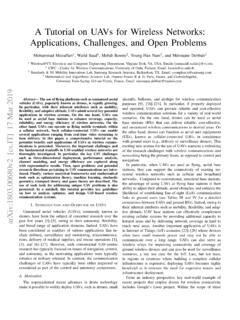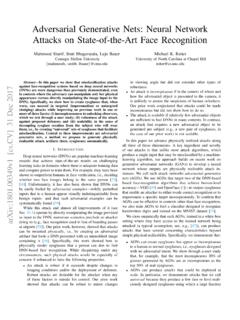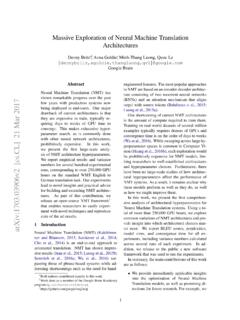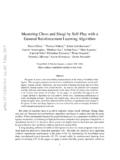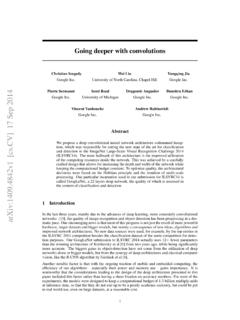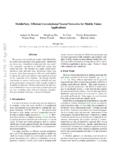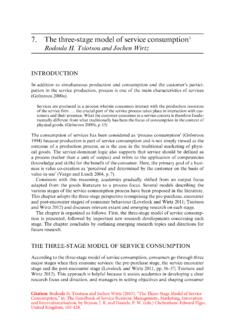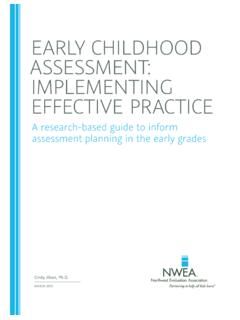Transcription of arXiv:1706.02275v4 [cs.LG] 14 Mar 2020
1 multi -Agent Actor-Critic for Mixed Cooperative-Competitive Environments Ryan Lowe Yi Wu Aviv Tamar McGill University UC Berkeley UC Berkeley OpenAI. [ ] 16 Jan 2018. Jean Harb Pieter Abbeel Igor Mordatch McGill University UC Berkeley OpenAI. OpenAI OpenAI. Abstract We explore deep reinforcement learning methods for multi -agent domains. We begin by analyzing the difficulty of traditional algorithms in the multi -agent case: Q-learning is challenged by an inherent non-stationarity of the environment, while policy gradient suffers from a variance that increases as the number of agents grows. We then present an adaptation of actor-critic methods that considers action policies of other agents and is able to successfully learn policies that require complex multi - agent coordination. Additionally, we introduce a training regimen utilizing an ensemble of policies for each agent that leads to more robust multi -agent policies. We show the strength of our approach compared to existing methods in cooperative as well as competitive scenarios, where agent populations are able to discover various physical and informational coordination strategies.
2 1 Introduction Reinforcement learning (RL) has recently been applied to solve challenging problems, from game playing [23, 28] to robotics [18]. In industrial applications, RL is emerging as a practical component in large scale systems such as data center cooling [1]. Most of the successes of RL have been in single agent domains, where modelling or predicting the behaviour of other actors in the environment is largely unnecessary. However, there are a number of important applications that involve interaction between multiple agents, where emergent behavior and complexity arise from agents co-evolving together. For example, multi -robot control [20], the discovery of communication and language [29, 8, 24], multiplayer games [27], and the analysis of social dilemmas [17] all operate in a multi -agent domain. Related problems, such as variants of hierarchical reinforcement learning [6] can also be seen as a multi -agent system, with multiple levels of hierarchy being equivalent to multiple agents.
3 Additionally, multi -agent self-play has recently been shown to be a useful training paradigm [28, 30]. Successfully scaling RL. to environments with multiple agents is crucial to building artificially intelligent systems that can productively interact with humans and each other. Unfortunately, traditional reinforcement learning approaches such as Q-Learning or policy gradient are poorly suited to multi -agent environments. One issue is that each agent's policy is changing as training progresses, and the environment becomes non-stationary from the perspective of any individual agent (in a way that is not explainable by changes in the agent's own policy). This presents learning stability challenges and prevents the straightforward use of past experience replay, which is . Equal contribution. crucial for stabilizing deep Q-learning. Policy gradient methods, on the other hand, usually exhibit very high variance when coordination of multiple agents is required. Alternatively, one can use model- based policy optimization which can learn optimal policies via back-propagation, but this requires a (differentiable) model of the world dynamics and assumptions about the interactions between agents.
4 Applying these methods to competitive environments is also challenging from an optimization perspective , as evidenced by the notorious instability of adversarial training methods [11]. In this work, we propose a general-purpose multi -agent learning algorithm that: (1) leads to learned policies that only use local information ( their own observations) at execution time, (2) does not assume a differentiable model of the environment dynamics or any particular structure on the communication method between agents, and (3) is applicable not only to cooperative interaction but to competitive or mixed interaction involving both physical and communicative behavior. The ability to act in mixed cooperative-competitive environments may be critical for intelligent agents;. while competitive training provides a natural curriculum for learning [30], agents must also exhibit cooperative behavior ( with humans) at execution time. We adopt the framework of centralized training with decentralized execution, allowing the policies to use extra information to ease training, so long as this information is not used at test time.
5 It is unnatural to do this with Q-learning without making additional assumptions about the structure of the environment, as the Q function generally cannot contain different information at training and test time. Thus, we propose a simple extension of actor-critic policy gradient methods where the critic is augmented with extra information about the policies of other agents, while the actor only has access to local information. After training is completed, only the local actors are used at execution phase, acting in a decentralized manner and equally applicable in cooperative and competitive settings. Since the centralized critic function explicitly uses the decision-making policies of other agents, we additionally show that agents can learn approximate models of other agents online and effectively use them in their own policy learning procedure. We also introduce a method to improve the stability of multi -agent policies by training agents with an ensemble of policies, thus requiring robust interaction with a variety of collaborator and competitor policies.
6 We empirically show the success of our approach compared to existing methods in cooperative as well as competitive scenarios, where agent populations are able to discover complex physical and communicative coordination strategies. 2 Related Work The simplest approach to learning in multi -agent settings is to use independently learning agents. This was attempted with Q-learning in [34], but does not perform well in practice [22]. As we will show, independently-learning policy gradient methods also perform poorly. One issue is that each agent's policy changes during training, resulting in a non-stationary environment and preventing the na ve application of experience replay. Previous work has attempted to address this by inputting other agent's policy parameters to the Q function [35], explicitly adding the iteration index to the replay buffer, or using importance sampling [9]. Deep Q-learning approaches have previously been investigated in [33] to train competing Pong agents.
7 The nature of interaction between agents can either be cooperative, competitive, or both and many algorithms are designed only for a particular nature of interaction. Most studied are cooperative settings, with strategies such as optimistic and hysteretic Q function updates [15, 21, 25], which assume that the actions of other agents are made to improve collective reward. Another approach is to indirectly arrive at cooperation via sharing of policy parameters [12], but this requires homogeneous agent capabilities. These algorithms are generally not applicable in competitive or mixed settings. See [26, 4] for surveys of multi -agent learning approaches and applications. Concurrently to our work, [7] proposed a similar idea of using policy gradient methods with a centralized critic, and test their approach on a StarCraft micromanagement task. Their approach differs from ours in the following ways: (1) they learn a single centralized critic for all agents, whereas we learn a centralized critic for each agent, allowing for agents with differing reward functions including competitive scenarios, (2) we consider environments with explicit communication between agents, (3) they combine recurrent policies with feed-forward critics, whereas our experiments use feed-forward policies (although our methods are applicable to recurrent policies), (4) we learn continuous policies whereas they learn discrete policies.
8 2. Recent work has focused on learning grounded cooperative communication protocols between agents to solve various tasks [29, 8, 24]. However, these methods are usually only applicable when the communication between agents is carried out over a dedicated, differentiable communication channel. Our method requires explicitly modeling decision-making process of other agents. The importance of such modeling has been recognized by both reinforcement learning [3, 5] and cognitive science communities [10]. [13] stressed the importance of being robust to the decision making process of other agents, as do others by building Bayesian models of decision making. We incorporate such robustness considerations by requiring that agents interact successfully with an ensemble of any possible policies of other agents, improving training stability and robustness of agents after training. 3 Background Markov Games In this work, we consider a multi -agent extension of Markov decision processes (MDPs) called partially observable Markov games [19].
9 A Markov game for N agents is defined by a set of states S describing the possible configurations of all agents, a set of actions A1 , .., AN and a set of observations O1 , .., ON for each agent. To choose actions, each agent i uses a stochastic policy i : Oi Ai 7 [0, 1], which produces the next state according to the state transition function T : S A1 .. AN 7 Each agent i obtains rewards as a function of the state and agent's action ri : S Ai 7 R, and receives a private observation correlated with the state oi : S 7 Oi . The initial states are determined by a distribution : S 7 [0, 1]. Each agent i aims to maximize its PT. own total expected return Ri = t=0 t rit where is a discount factor and T is the time horizon. Q-Learning and Deep Q-Networks (DQN). Q-Learning and DQN [23] are popular methods in reinforcement learning and have been previously applied to multi -agent settings [8, 35]. Q-Learning makes use of an action-value function for policy as Q (s, a) = E[R|st = s, at = a].
10 This Q. function can be recursively rewritten as Q (s, a) = Es0 [r(s, a) + Ea0 [Q (s0 , a0 )]]. DQN learns the action-value function Q corresponding to the optimal policy by minimizing the loss: L( ) = Es,a,r,s0 [(Q (s, a| ) y)2 ], where y = r + max (s0 , a0 ), Q (1). 0 a where Q is a target Q function whose parameters are periodically updated with the most recent , which helps stabilize learning. Another crucial component of stabilizing DQN is the use of an experience replay buffer D containing tuples (s, a, r, s0 ). Q-Learning can be directly applied to multi -agent settings by having each agent i learn an inde- pendently optimal function Qi [34]. However, because agents are independently updating their policies as learning progresses, the environment appears non-stationary from the view of any one agent, violating Markov assumptions required for convergence of Q-learning. Another difficulty observed in [9] is that the experience replay buffer cannot be used in such a setting since in general, P (s0 |s, a, 1.)
![arXiv:0706.3639v1 [cs.AI] 25 Jun 2007](/cache/preview/4/1/3/9/3/1/4/b/thumb-4139314b93ef86b7b4c2d05ebcc88e46.jpg)
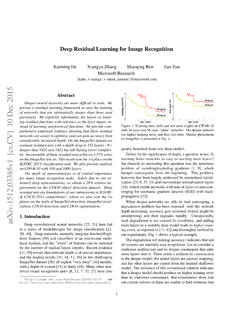
![arXiv:1301.3781v3 [cs.CL] 7 Sep 2013](/cache/preview/4/d/5/0/4/3/4/0/thumb-4d504340120163c0bdf3f4678d8d217f.jpg)
![@google.com arXiv:1609.03499v2 [cs.SD] 19 Sep 2016](/cache/preview/c/3/4/9/4/6/9/b/thumb-c349469b499107d21e221f2ac908f8b2.jpg)
